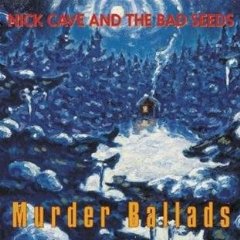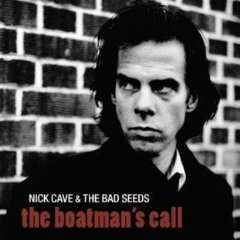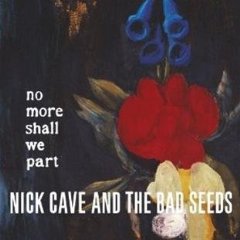Home » Jazz Articles » Multiple Reviews » Nick Cave & The Bad Seeds: On Fertile Ground
Nick Cave & The Bad Seeds: On Fertile Ground
Music styles change over the years, with each era producing its own idols. Like other great artists such as Bob Dylan, Leonard Cohen and Tom Waits, Cave has the ability to serve as a mirror to his audience. His songs allow listeners to question or to come to terms with their own feelings. He has, however, made a career of writing about his own obsessions. His shape shifting from record to record has put even his most devoted fans to the test over the years.
This third batch of reissues are from a period when the wheel of fortune began to speed up for the band. The 1990s were a fruitful time for Cave and his "seeds of evil." The decade saw the outfit moving up the ladder both in terms of quality and maturity. The music produced was a natural outgrowth of the outlaw rock music of the 1980s. It was also a stressful period, as commercial success was seen as betrayal and commercialization by some fans. However, these four albums consist of nonpareil, damaged and daring music that is both emotion-stirring and crotch-clutching, coming from a band averse to compromise.
 Nick Cave and the Bad Seeds
Nick Cave and the Bad SeedsLet Love In
Mute Records
2011 (1994)
For Nick Cave and his band, Let Love In represents a change of direction as well as a change of artistic perspective. Released in 1994, it allowed Cave to finally emerge from the familiar underground of the music business and planted him in the overground music scene. Let Love In is the sound of a band at the top of its game. The songs are joined very close together lyrically, although musically are quite diverse. The band has availed itself of a variety of styles, oscillating between the extremes of vaudeville and bar music, rock, gospel and country, to come up with a musical framework on which Cave could lay out his personal lyrics. The songs testify a profound sense of confession, self-accusation and conciliation. It bears the idea of letting love in and experiencing what love has to give.
There is nothing superfluously romantic on this record despite the title. It just thematically uses the subject of love in various environments and it delivers several blows below the belt. The album vacillates between admonishment and the pleasures of being in love. In 1998, Cave, among others, was invited to participate in a literary project to supply a foreword to a reissue of the King James Bible. In his essay, Cave mentions that it was the Old Testament that has captivated him with all of its brutality and harshness. He was thoroughly taken by this vengeful god who tried the people by bringing upon them catastrophes in various forms. One of them is surely love, given by God and all his devils, and the flood of sorrow and disappointment that follow shoulder to shoulder with fulfillment and happiness.
You can sense the theater that is happening from the first song and it unfolds until the last. Probably for the first time, rather than hiding behind an imaginary character, as he had done numerous times before, Cave sang in the first person. The conviction in his voice adds weight to these songs. The opening "Do You Love Me" is a real gem. Ferociously sung, it is an ode to a doomed love, that, no matter how great and fulfilling, is destined to end. "Nobody's Baby Now' is a sweet and ironic piano-based ballad, while the gospel influenced "Lay Me Low" and "Ain't Gonna Rain No More" are filled in with subdued anger, sorrow and fleeting depression. The viciously angry rock style from the past is best seen on sonic assaults such as "Thirsty Dog" and "Jangling Jack."
Let Love in is one of the groundbreaking records of the 1990s. It is full of songs packed with raw emotional power. Ever since it was first released, it has been perceived as the best in Cave's canon and it truly deserves all the accolades it has received. Only few bands can marshal such sublime power.
 Nick Cave and the Bad Seeds
Nick Cave and the Bad SeedsMurder Ballads
Mute Records
2011 (1996)
Murder Ballads was Cave's ninth album. If Let Love In circled around the concept of love, this time Cave devoted his songs to murder and violence. It seems that Cave has poured his preoccupation with killing and death into a formula that has enabled him to exorcise his demons. As the title suggests, it is a bloody affair—there are 66 corpses by the end of the album. It is an irony of the brutality of killing. but presented through beautifully constructed pop songs.
This is best presented on "Where the Wild Roses Grow." The song takes the point of view of a dead woman and it is a beautiful rumination on the human face lost to acts of sudden, incomprehensible violence. As a pop tune "Where the Wild Roses Grow" is always going to resonate well beyond its simple story of love and murder.
As the songs turn, so does the body count increase. The album ends with a version of Dylan's "Death is Not the End" that is brutally direct. This is one of those rare occurrences where the cover is better than the original.
The album is still critically undervalued, probably because of the duet with Kylie Minogue and the major mainstream success that overshadowed the quality and the humor on this set. Partly that duet served notice that Cave was willing to risk his popularity for his principles, that he was not part of any underground or mainstream movement. By his own admission, this is an album for which he has no great emotional attachment to. But it is not a throwaway album in any sense.
 Nick Cave and the Bad Seeds
Nick Cave and the Bad SeedsBoatman's Call
Mute Records
2011 (1997)
The Boatman's Call is the album that comes closest to fully realizing Cave's artistic ambitions. He has often expressed the desire to write songs of deep personal illumination and here he achieves it brilliantly. Boatman's Call is a fully sustained work with songs that speak directly about human relationships and concerns, devoid of self-righteousness. The songs hone in on "beauty and simplicity," resulting in a record that seeps with regret, wisdom, helplessness and a confessional sense of hurt. It is his quest for meaning, love and fulfillment.
The lyrics are deep and sorrowful and were written as if the songs were meant to be read aloud, not sung. Cave had never been so emotionally direct. The songs are deliberately very minimal and sparse while Cave, who portrays a person who has gone through suffering throughout most of his life, takes the songs with a twist of duality—no joy without sorrow and no pain without consolation.
The praise he sings to his beloved is followed by bitter remarks and recriminations about unfulfilled love. Most of the songs were inspired by past relationships. At the time, Cave gave a lecture on writing love songs pointing that they all need to have moments of grief and loneliness, and asserting that love songs that only show passion and the sunny side are actually camouflaged hate songs. "Far from Me" is a bittersweet song and a lament for a woman and relationship that starts up very happy and ends up very sad. When he sings about her and praises her, he also feels the pain of her absence.
Boatman's Call is a rare record that reveals more rather than it conceals, even though it has an introverted and frugal character. Undoubtedly, a product of Cave's own struggles to come to grips with the dissolution of his relationships, the album is deeply rooted in the dark side of life through themes of love lost and being lost.
 Nick Cave and the Bad Seeds
Nick Cave and the Bad SeedsNo More Shall We Part
Anti
2011 (2001)
Boatman's Call changed the way Cave wrote his songs. No More Shall We Part introduces a new Nick Cave: older, more mature, wiser, and with a prevailing preaching tone. The album broke the four years silence that followed Boatman's Call, during which time Cave married and became the father of twins.
There is a great depth to this album; it bears a certain mournful feeling throughout. It is a slower, seductive offering that spans the sentimental and sad as well as the raging. It also spans hope and despair. The music is simple and sparse with an emphasis on lyrics and moods, as always. Cave is intoxicating with his vocal deliveries on sweeping ballads like "As I Sat Sadly By Her Side" and "Love Letter," in particular, and they assume a dark and otherworldly allure. The opening "As I Sat Sadly By Her Side" is a mournful song that brims with devastating sadness.
There are plenty of other gems on this record. They are touched by more of a somber, gospel grace. The band provides a great backdrop for Cave's deep baritone.
No More Shall We Part marked a decline in what Cave and the Seeds had to offer. It is a work by an artist facing middle age and the tone reflects that, which is probably the reason for the spooked vibe and rainy atmosphere throughout. Yet it's a powerful album, and certainly one of Cave's most deeply personal works.
Tracks and Personnel
Let Love In
Tracks: Do You Love Me?; Nobody's Baby Now; Loverman; Jangling Jack; Red Right Hand; I Let Love In; Thirsty Dog; Ain't Gonna Rain Anymore; Lay Me Low; Do You Love Me? Pt 2.
Personnel: Nick Cave: vocals, organ, pianos, oscillator, bells; Blixa Bargeld: guitar, backing vocals; Martyn P. Casey: bass; Mick Harvey: guitar, backing vocals, organ, drums, bell, tambourine, shaker; Conway Savage: backing vocals, piano; Thomas Wydler: drums, tambourine, timpani, shaker, triangle.
Murder Ballads
Tracks: Song of Joy; Stagger Lee; Henry Lee; Lovely Creature; Where the Wild Roses Grow; The Curse of Millhaven; The Kindness of Strangers; Crow Jane; O'Malley's Bar; Death Is Not the End.
Personnel: Nick Cave: vocals, piano, organ; Blixa Bargeld: guitar, vocals; Martyn P. Casey: bass; Mick Harvey: drums, guitars, organs, backing vocals, bass, percussion; Conway Savage: piano, backing vocals, organ; Jim Sclavunos: drums, percussion, bells, tambourine; Thomas Wydler: maracas, drums, tambourine, vocals; PJ Harvey: vocals (3, 10); Kylie Minogue: vocals (5, 10).
Boatman's Call
Tracks: Into My Arms; Lime Tree Arbour; People Ain't No Good; Brompton Oratory; There Is a Kingdom; (Are You) The One That I've Been Waiting For?; Where Do We Go Now But Nowhere?; West Country Girl; Black Hair; Idiot Prayer; Far From Me; Green Eyes.
Personnel: Player Name: Nick Cave: vocals, piano, organ, keyboards, vibes; Mick Harvey: electric guitar, acoustic guitar, bass, organ, vibes; Blixa Bargeld: electric guitar; Warren Ellis: violin, accordion; Jim Sclavunos: drums, melodica, bells; Conway Savage: additional piano, backing vocals; Martyn P. Casey: bass; Thomas Wydler: drums, maracas.
No More Shall We Part
Tracks: As I Sat Sadly by Her Side; And No More Shall We Part; Hallelujah; Love Letter; Fifteen Feet of Pure White Snow; God Is in the House; Oh My Lord; Sweetheart Come; The Sorrowful Wife; We Came Along This Road; Gates to the Garden; Darker with the Day.
Personnel: Nick Cave: vocals, piano; Mick Harvey: guitar, string arrangement, drums; Blixa Bargeld: guitar; Conway Savage: organ; Warren Ellis: violin; Martyn P. Casey: bass; Thomas Wydler: drums.
Tags
PREVIOUS / NEXT
Support All About Jazz
 All About Jazz has been a pillar of jazz since 1995, championing it as an art form and, more importantly, supporting the musicians who make it. Our enduring commitment has made "AAJ" one of the most culturally important websites of its kind, read by hundreds of thousands of fans, musicians and industry figures every month.
All About Jazz has been a pillar of jazz since 1995, championing it as an art form and, more importantly, supporting the musicians who make it. Our enduring commitment has made "AAJ" one of the most culturally important websites of its kind, read by hundreds of thousands of fans, musicians and industry figures every month.




















